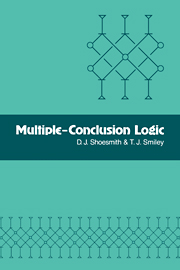Preface
Published online by Cambridge University Press: 06 July 2010
Summary
Logic is the science of argument, but ordinary arguments are lopsided: they can have any number of premisses but only one conclusion. In multiple-conclusion logic we allow any number of conclusions as well, regarding them (in Kneale's phrase) as setting out the field within which the truth must lie if the premisses are to be accepted. Thus we count a step in such an argument as valid if it is impossible for all its premisses to be true but all its conclusions false. Anything that can be said about premisses can now be said, mutatis mutandis, about conclusions. (For example, just as adding a member to a set of propositions makes more things follow from them, i.e. strengthens them as potential premisses, so it makes them follow from more things, i.e. weakens them as potential conclusions.) The subject owes much of its interest to the exploitation of this formal symmetry, while the contrasts between multiple- and single-conclusion calculi throw a fresh light on the conventional logic and its limitations.
Our subject is in its infancy. Its germ can be found in Gerhard Gentzen's celebrated Untersuchungen über das logische Schliessen (1934) if one is prepared to interpret his calculus of ‘sequents’ as a metatheory for a multiple-conclusion logic, but this is contrary to Gentzen's own interpretation, and it was Rudolf Carnap who first consciously broached the subject in his book Formalization of logic (1943).
Information
- Type
- Chapter
- Information
- Multiple-Conclusion Logic , pp. ix - xivPublisher: Cambridge University PressPrint publication year: 1978
